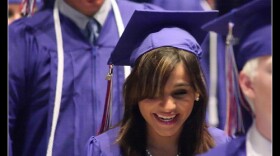Administrators at Guyer High School in Denton County got tired of seeing immigrant kids miss out on college. The school started a new mentoring program with the University of North Texas to bring college students to campus in the hopes that college will seem a little less far away.
Misty Chestnut, an assistant principal at Guyer High, recently stopped sophomore Arturo Lara in the school’s counseling center.
“Did you talk to Mr. Carter about your tests?” she asked.
“Yeah,” he said, with as much enthusiasm as 16-year-old usually muster for adults.
“You got a B!” she said, and gave him a high five.
Chestnut is willing to try anything to get Arturo into college, along with the dozens of other immigrants and children of immigrants at Guyer.
“That particular group in our campus is disenfranchised,” she said.
The obstacles to college are many: money, of course, but also knowing how to apply, when to take the SAT and ACT, how to find scholarships, how to fill out the FAFSA for federal student aid.
“They don’t want to fill out this paperwork, they don’t want to be tracked,” Chestnut said.
“There are obstacles for this population of kiddos that aren’t addressed through programs that we’ve done for college readiness in the past.”
Rosanna Boyd, director of the bilingual teacher certification program at the University of North Texas, sent students to Guyer High School this fall and last spring as mentors—students who understand these obstacles.
“It’s so complex, just to apply for FAFSA, or just to apply to a university. Many times [these students] just give up,” Boyd said.

An older friend who understands the process can be invaluable for a high schooler whose family doesn't know how to help them apply for college.
Sophomore Emily Avila, 15, liked talking with her mentor every week.
“Money problems was what we had for a connection,” Emily said.
“She told me her story, and it connected to mine. It gave me an idea of how I could do it for college,” she said.
No one in Emily’s family has been to college. Emily had never been on a college campus until her mentor showed her around UNT.
“They told me about all these scholarships, and money they can give you, and I really thought about really going to college,” she said.
UNT master's student Elia Alducin-Garcia mentored a few students at Guyer this fall. An immigrant from Mexico herself, she said the payoff for struggling through college is huge.
“I’m going to be the first one in my family to have a master’s and that makes me so proud. It also makes proud my mom,” she said.
As much as she wanted to hold the kids’ hands all the way through the application process, Alducin-Garcia found that some things they have to figure out on their own.
“I show them how much they can make with a high school degree, an associate's, and a bachelor's. And some seem not to understand. And I look at them and think to myself, ‘I didn’t understand this until I was 27,’” she said.
She had some successes as a mentor, and a few missteps, especially with the boys.
“I didn’t know how to control them,” she admitted. Having more men as mentors is a high priority for the next time around.
There are positive signs from the first mentored group at Guyer. They took the PSAT last weekend, one step toward getting on the college track.
More teenagers weigh in on college access in KERA’s American Graduate Yearbook Project at yearbook.kera.org.





